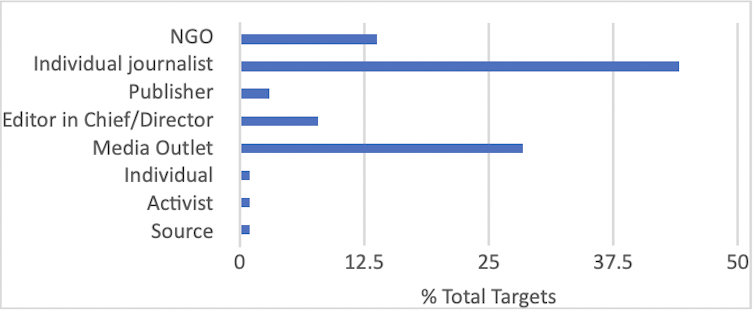[ad_1]
There’s a rising risk to the rule of regulation, democracy and human rights in Europe. It manifests as seemingly run-of-the-mill lawsuits. Nevertheless, on nearer inspection, many lawsuits should not as they appear.
Relatively than trying to treatment a improper, lawsuits can have a way more insidious aim – to suppress truths and to silence criticism. These lawsuits are referred to as “strategic lawsuits in opposition to public participation” or Slapps.
Slapps goal individuals who converse out on something from local weather change to cash laundering. For individuals who would fairly their critics keep silent, and their wrongdoings go unreported, there’s a playbook of abusive litigation ways available.
These ways are enlisted by the wealthy and highly effective to drive up the monetary and psychological burden of defending a lawsuit till their opponents are left with no alternative however to cease reporting or campaigning. They have a tendency to wipe the general public file clear, and to isolate the few who’re ready to withstand makes an attempt at censorship, generally with deadly penalties.
Such was the case for Daphne Caruana Galizia, the Maltese investigative journalist assassinated on October 16 2017. On the time of her homicide, she had dozens of lawsuits pending in opposition to her for rigorous reporting on an online of corruption – a chilling reminder of the lengths some folks will go to to close down criticism.
We had been just lately commissioned to put in writing a report for the EU Parliament analysing using such lawsuits throughout the EU since January 2022. What we discovered was unsettling.
We recognized 47 lawsuits focusing on over 100 folks, together with journalists and campaigners. And these had been the instances we had been capable of determine. It’s clear from the existence of anonymised knowledge that these instances are simply the tip of the iceberg.
These 47 instances involved over 80 public curiosity issues, together with journalistic reporting on corruption and monetary crime. If the Slapps succeed, they may wipe the general public file of necessary info that may affect every part from how we vote to what we devour. These lawsuits thereby have a chilling impact far past the fast goal.
Who will get Slapped?

Writer offered., CC BY-SA
There’s a clear want for the EU to guard freedom of expression and the liberty of the press by empowering folks like Caruana Galizia to ask courts to strike out these abusive lawsuits at an early stage. And that is exactly what the EU is doing. EU legislators at the moment are negotiating the ultimate textual content of an Anti-Slapp directive, colloquially termed “Daphne’s regulation”.
Nevertheless, our report reveals a few of the small modifications proposed to the language of Daphne’s regulation may depart most Slapp victims exterior its safety.
Quick stumbling block
For the EU to legislate on Slapps, it first needed to set up that it had the ability to take action. This was confirmed through article 81 of the Treaty on the Functioning of the European Union, which permits the EU to legislate on issues with cross-border implications. So, for a Slapp to return inside the scope of the proposed protections, it should first be labeled as having “cross-border implications”. That is the place the primary downside arises.

EPA
There may be disagreement between the EU establishments as to what quantities to a cross-border implication. The European Fee proposes that it means any civil lawsuit the place not less than one of many events concerned lives in a distinct EU member state to the place the lawsuit is being heard or the place the communication (for instance, a newspaper article or blogpost) considerations a matter of public curiosity which is related to multiple member state or the place the claimant has opened a authorized motion in multiple member state.
The Council of the European Union, which is made up of ministers from the member states’ governments, then again, desires to take away any definition. This could produce uncertainty and will find yourself eradicating most instances from the scope of the directive.
There’s a worry that and not using a clear definition within the directive, states could be free to undertake a slender definition of “cross-border” as solely capturing instances the place the defendant lives in a distinct nation to the courtroom listening to the case.
Most instances are cross-border
We discovered that over 85% of instances involved public curiosity issues which had been related to multiple member state. One of many instances, for instance, associated to the procurement of medical provides throughout the COVID-19 pandemic. One other focused three journalists reporting on alleged corruption in Bulgaria, at its border with Turkey and Greece.
However, the domicile of the defendant and the courtroom differed in solely 4% of instances. Which means if the second a part of the Fee’s understanding is disregarded of the ultimate directive, or if, because the Council suggests, the definition of cross-border implications is eliminated solely, we’d see a state of affairs the place solely a small share of Slapp victims are protected by the directive.
Learn extra:
Slapps: the rise of lawsuits focusing on investigative journalists
The opposite large subject is that the proposal units too excessive a bar for dismissing a Slapp. The goal has to show that the Slapp is unfounded past any cheap doubt. Any Slapp claimant with a reliable lawyer can defeat such a problem – and that actually tends to be the case for the highly effective actors who typically carry Slapp claims.
The influence of this hurdle can’t be overstated. Not one of the instances we analysed may meet such a normal. As an alternative, the EU ought to shield folks every time these lawsuits present indicators of being abusive.
With out freedom to genuinely report on issues of public curiosity, our democracies will slowly wither. Because the Anti-Slapp directive makes its approach by the ultimate levels of the legislative course of, now’s a pivotal time to recollect what’s at stake.
Anti-Slapp legal guidelines don’t solely search to guard the Slapp goal – they’re an try to make sure that info is a public useful resource and never one managed by the wealthy and highly effective.
[ad_2]
Source link

